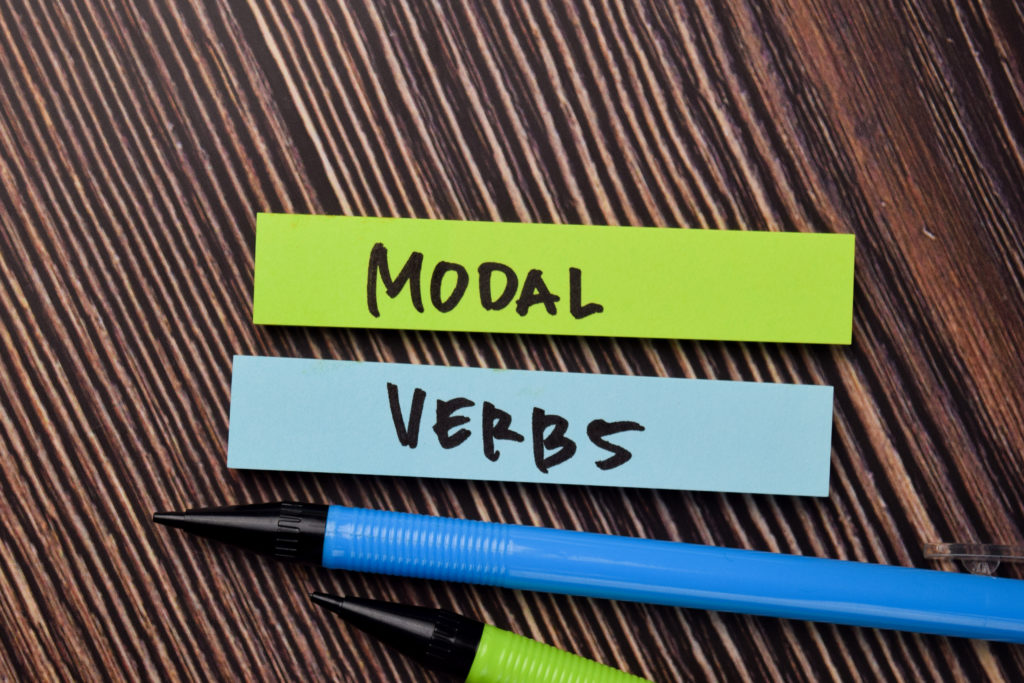Hello lovely students! Modal verbs play an important part in English grammar and we use them when we speak English daily. Do you have any doubts about how to use them? Read the article below and you’ll be an expert in no time.

What are modals?
Modal verbs are a type of auxiliary verb that is used to express a range of things. These include hypothetical situations, ability, giving suggestions, giving permission, giving advice, obligation, necessity, polite requests, polite questions, possibility and certainty.
Modal verbs are auxiliary verbs as they act as helper verbs. They are known as modal auxiliaries. This means they normally help to express the main verb so the meaning of the sentence is clearer to the listener.
Modal verbs cannot be used alone in context.
Another important thing to remember is that modals can be used in any tense. They are fluid like water as a lot of auxiliary verbs are.
But more on that later. I take it you’re now ready to learn the common modal verbs we use in the English language, so take a look at the next section.

What are the modals?
The key nine modal verbs are; could, should, would, may, might, will, shall, can and must. Look at the table below for some examples.
| Positive form | Negative form |
| could | couldn’t/ could not |
| should | shouldn’t/should not |
| would | wouldn’t/would not |
| may | may not |
| might | might not * |
| will | won’t/will not |
| shall | shan’t/shall not |
| can | can’t/cannot |
| must | mustn’t/must not |
*we can use mightn’t as a negative but we tend not to in spoken English
Could
Could is used for multiple situations in English.
1) To talk about what you to had permission to do in the past
You said we could go and play outside if we finished our homework!
When I was younger, my parents said I could eat dessert only when I finished my dinner.
2) For past abilities
I could stay up all night and go to work the next morning in my early twenties. No chance of that happening now.
When my nan was little she could speak French.
3) A polite form of can when asking for permission or for someone to provide something
Could you lend me £10?
Could you pass me the salt?
4) For making suggestions
We could go to the cinema instead of bowling if you want.
I could go into more detail about the project if you are still unsure.
5) To express possibility or probability
They could arrive at any time.
This new medicine could cure this terrible disease.
It could rain tomorrow.

Should
1) To give useful suggestions
You should drink camomile to help you sleep.
She should watch British TV if she wants to learn British English but can’t go there.
2) For expectations
My bedroom should be finished by Saturday.
I don’t know where Farhana is. She should be here by now.
3) In conditionals for possible situations
Should you need me, I will be in my office.
Should you have any more questions, feel free to ask them.

Would
1) The past tense form of will
My computer wouldn’t start this morning.
He said he wouldn’t come swimming with me.
2) Describe things in the past that happened often
My grandfather would always give me sweets when I went to his house.
I remember Mrs Biggs. She would always read us a story at the end of the day.
3) For an intention made in the past
I said I would help you, so that’s why I am here.
We said we would learn English with you.
4) For polite offers
Would you like to come with us to the Maldives?
Would you like me to take you to dinner?
5) With conditional sentences
If I had time, I would visit him.
What would you do if you lost your car?

May
1) To ask permission
May I go to the ball?
May we eat that piece of cake?
This is the same meaning as could.
2) To give permission
You may go out tonight.
You may take out three books at once from this library.
3) To give hope and encouragement
May the best person win.
May all your doubts be gone.
4) For predictions and possibility
I may win. You never know.
The children may like it.

Might
1) To express a possibility
I might go and see Tony in Australia next year if I can save enough.
You might have an accident if you drive that fast.
2) To make a suggestion politely
You might want to add some cheese to the sauce next time.
They might want to try them on before buying them.

Will
1) In the future for spontaneous actions
I’ll close the windows if you are cold.
We’ll make dinner if you lot are hungry.
2) To talk about a prediction
You’ll be tired if you watch television all night.
He’ll express a lack of sympathy if you tell him that you didn’t have enough time to complete the task when you received an extension.
3) When you are willing to do something
I’ll give her a lift to the airport.
If her phone doesn’t function tomorrow, we’ll help her choose a new one.
4) When you ask someone to do something, usually with urgency
Will you keep the noise down?
Will he pass on his contact?

Must
1) To show obligation
I must pay my bills.
You must wear your seatbelt in the car.
2) When you have a strong intention for the future
I must call my mum!
I mustn’t cut my hair.
3) To emphasise when you think something is a good idea in the future
They must meet Barney soon.
You must come and stay with us when you’re next here.
4) When something is more than likely to be true
You must know Dwayne.
She must be tired. She’s been working all day.

Shall
1) With “I” or “we” to make a suggestion
Shall we go out tonight?
Shall I make us some tea?

Can
1) For a present ability
I can tell you all the Spanish words I learnt today.
Albert can play the flute.
2) For a request like could and may
Can I see you tomorrow?
Can we have a glass of water?
3) For encouragement
Your teacher believes you can finish all your homework.
You can do it!
4) To express permission
You can leave once you have finished.
You can use my phone.
5) To express general possibility
You can get diseases from swimming in lakes.
It can be noisy in a hotel.

How do we use modal verbs in sentences?
As mentioned above, modal verbs are used in a lot of tenses. Let’s take a look at how this is done.
Simple Present Tense
In the simple present tense, modal verbs are followed by the bare infinitive. What is the bare infinitive, you ask? It is the infinitive without to. No s is added to the end of the verb as it is not grammatically correct. This applies to all pronouns even if they are in the third person.
Affirmative: subject + modal + bare infinitive form – I can do it.
Negative: subject + negative modal + bare infinitive form – I can’t do it.
Question: modal + subject + bare infinitive form – Can I do it?
Note: for questions, we swap the subject and modal, just like in other auxiliary verbs.

Present and future continuous tenses
In the present continuous and the future continuous, modals are formed as below.
Affirmative: subject + modal + be + ing verb – I will be dancing tomorrow.
Negative: subject + negative modal + be + ing verb – I won’t be dancing tomorrow.
Question: modal + subject + be + ing form – will I be dancing?
Note: we only use the modal verb will for the future continuous.

Present Perfect Simple
Modals used with the present perfect are often referred to as perfect modals. These allow us to illustrate actions, events or possibilities in the past.
Affirmative: subject + modal + have + past participle = I could have come.
Negative: subject + negative modal + have + past participle = I couldn’t have come.
Question: modal + subject + have + past participle = Could I have come?
Note: please watch the second link at the bottom of this page for more information.

Idiomatic Phrases with modal verbs
Can’t bear/can’t stand
When you strongly dislike someone or something.
I can’t bear that new documentary. It’s awful!
I know you can’t stand Ruth, and neither can I!
Time will tell
When you’ll discover in the future what the result is of your present situation.
Time will tell whether it was wise to spend that money
People (who live) in glass houses shouldn’t throw stones
If you cannot take criticism, you should not give criticism.
Prahan can never take criticism and I say to him that he shouldn’t throw stones.
Could do it with your eyes closed
When something is so easy to do, you can close your eyes and still do it.
Navigating this city is so easy, I could do it with my eyes closed.
Wouldn’t say boo to a goose
Used to describe a nervous or shy person.
Linda is very quiet. She wouldn’t even say boo to a goose.

Is that everything?
Absolutely not! Check out my youtube videos on modals below, on my channel, English with Lucy.